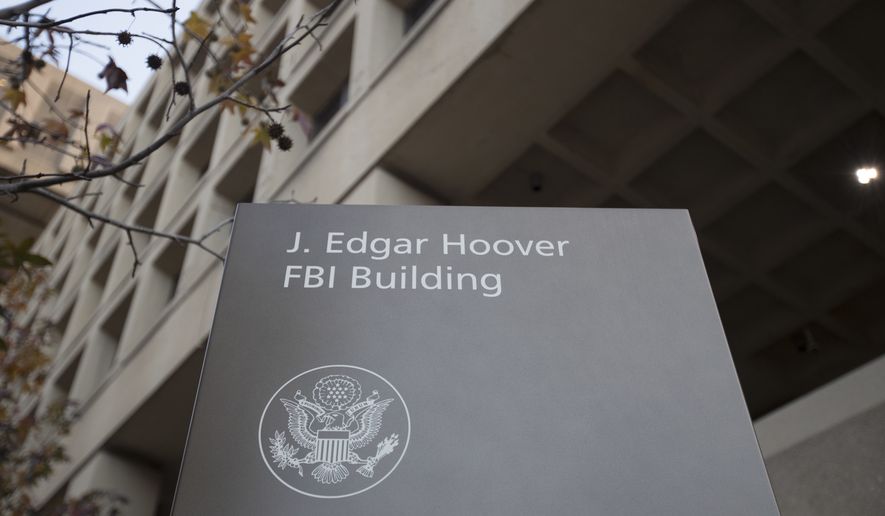House lawmakers said Tuesday that they want answers about the FBI’s operations after an internal audit revealed agents flouting the rules during investigations involving politicians, candidates, religious groups, news media and others.
FBI agents broke their own rules at least 747 times in 18 months while conducting sensitive investigations, according to an internal 2019 FBI audit first reported by The Washington Times.
Rep. Andy Biggs, Arizona Republican, said the audit’s findings should not come as a surprise.
“The FBI has strayed away from its core mission of protecting the American people and upholding the Constitution of the United States,” Mr. Biggs said in a statement. “They have a track record of not following the law, and that should concern all Americans. Congress must investigate this report and hold those accountable who enable this behavior.”
The internal review showed a ratio of slightly more than two “compliance errors” per sensitive investigative matter reviewed by FBI auditors.
Agents’ errors from Jan. 1, 2018, to June 30, 2019, included failure to get approval from senior FBI officials to open an investigation, failure to document a necessary legal review before starting an investigation, and failure to tell prosecutors what they were doing.
Sensitive investigative matters are actions that may affect Americans’ constitutional rights because they involve people engaged in politics, government, media, religious expression and other activities.
“We need to dispel the absurd but prevalent misconception that the FBI is an independent agency accountable to no one or even capable of self-policing,” Rep. Thomas Massie, Kentucky Republican, said in a statement. “They are part of the executive branch and the president should fire any director who tolerates this level of malfeasance.”
The audit does not reveal the identities of the groups and people investigated by the FBI, but a categorical breakdown showed most of the cases examined, 191, involved domestic public officials.
Dozens more cases involved religious organizations or their prominent members, and dozens involved political organizations and individuals. An additional 10 cases involved domestic political candidates, and 11 cases involved news outlets.
The FBI auditors reviewed a small portion of the bureau’s total portfolio. Cato Institute senior fellow Patrick Eddington said he thinks much FBI wrongdoing remains unexamined.
Mr. Eddington uncovered the audit in litigation against the FBI for access to government records.
The audit said 70% of the 747 errors were “related to approvals, notifications and administrative matters.”
For example, 35 full investigations and four preliminary investigations did not have the approval of an FBI special agent in charge.
Congress is worried that the FBI might be opening investigations without facts showing criminal wrongdoing.
Last week, two members of the House Oversight and Reform Committee asked the Government Accountability Office to review the FBI’s surveillance of individuals and groups through agents’ “assessments.”
According to the 2008 Attorney General’s Guidelines for Domestic FBI Operations, assessments may lead to investigations. They can include surveillance not requiring a court order, the use and recruitment of human sources, and the examination of publicly available information.
Reps. Jamie Raskin, Maryland Democrat, and Nancy Mace, South Carolina Republican, said they wanted the GAO to study whether FBI agents’ assessments yielded improper monitoring of constitutionally protected activity of Americans, including those in political, racial or religious organizations.
Ms. Mace said Tuesday that the GAO committed to conducting a full review of the FBI’s actions and she expected to receive a report within the next two months.
“It seems like this program, these assessments, are crossing the line and [are] abusive, and violating individuals’ civil liberties and civil rights,” Ms. Mace said.
Ms. Mace said she wants to see GAO’s forthcoming report before determining how Congress should proceed in its oversight of the FBI.
She said her staff is working with Mr. Raskin’s team and they will collaborate on deciding what steps to take.
Other lawmakers’ recent efforts to get information about the FBI’s domestic operations have not been successful.
In December, the FBI told Sen. Charles E. Grassley, Iowa Republican, that it did not need to explain its 2016 probe of the conservative group Concerned Women for America.
After conducting an assessment of the group, the FBI revealed last year that there was nothing to pursue.
Mr. Massie said he does not trust Democrats to hold the FBI accountable.
“Sadly, under the Democrats, Congress, which created the FBI, has also failed to provide sufficient oversight of this agency while continuing to increase its funding,” Mr. Massie said. “When Republicans retake the majority, I expect our Judiciary Committee will investigate several issues that have been swept under the rug.”
The FBI did not respond to a request for comment Tuesday.
Previously, the FBI had declined to comment on matters involving pending litigation, which unearthed the audit.
The FBI said on Thursday that it takes compliance seriously, especially for sensitive investigative matters, which is why it conducted the 2019 audit.
“While the number of deviations from FBI approval, notification, and administrative requirements noted in the report is unacceptable, we began implementing important changes in training and raising awareness even prior to issuance of the report, and we remain committed to ensuring all personnel adhere to our internal investigative and operational guidelines,” the FBI said in a statement to The Times.
• Ryan Lovelace can be reached at rlovelace@washingtontimes.com.




Please read our comment policy before commenting.